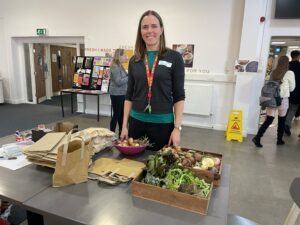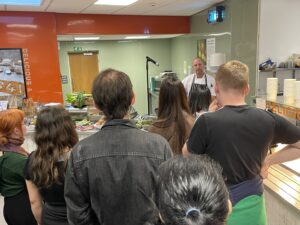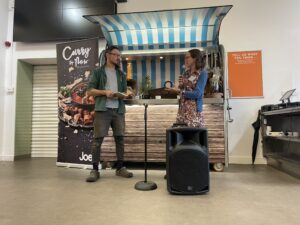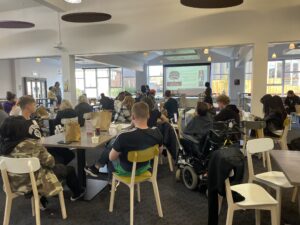The LIVING LAB is a network of students and staff from different subjects and departments, all collaborating to investigate a real-life, local, social and ecological justice issue, and work together to find solutions. Our new Living Lab – FEEDING THE CAMPUS – aims to create a campus food system that better meets the needs of both people and planet.

Energy and Environmental Projects Officer Sarah Williams with some of the donated locally grown vegetables at the Living Lab launch
Food raises a lot of issues, and not just what it tastes like.
How is it produced? By whom, how far away, and how much are they paid? What soil is it growing in, what animals live on and around it when it grows? How is it shared out? Can everyone afford it, and the means to cook it? What stories does it remind them of? What does it say about who they are and where they come from? Are too many people eating it alone? Is it healthy and safe? What happens to the leftovers?
The answers to these questions add up to a ‘food system’. As a university campus we are part of a food system of our own, and there is more we can do to be positive actors in it. All over York, the UK and the world, groups of people are innovating different ways of getting good food to people. Throughout the Living Lab we’ll be learning from a lot of these social enterprises and other projects, and seeing how we can connect with them here on campus. Simultaneously, we’ll be working towards Soil For Life accreditation for our own catering services, and involving students in the process.
That’s why a Wednesday afternoon at the beginning of a new term saw over 60 students and staff from numerous departments of the university pour into the cafeteria for a shared meal. Called a ‘Stone Soup’, the ingredients came from local community food projects (YourCafe and Food Circle York), staff’s own allotments, and food grown on campus itself. The delicious soup cooked up from these by campus chef Steve Broadhurst was, in a sense, a microcosm of an alternative food system.

Campus chef Steve teaching students his soup recipe
When guest speaker Joe Fennerty told us the story of Food Circle York’s model of food production (consisting of polytunnels, a community egg cooperative, a market and an inclusive pay-as-you-can food distribution system), he didn’t hold back on the challenges of creating a genuine alternative to the current industrialised food system.

Guest speaker Joe Fennerty of Food Circle York CIC
Here on campus, too, we have challenges. Although campus catering has been brought in-house and decisions are made carefully to balance the best interests of suppliers, students and staff, and the environment, there are problems the catering and estates team can’t solve on their own. At the simple end of the scale, problems like: how can we increase the uptake of plant-based options and reusable cups and containers? At the complex end: how can our campus be part of creating a more localised, healthy, resilient food system that doesn’t rely so heavily on global food chains with all the waste, exploitation and carbon emissions they generate?
These are questions that need expertise from many disciplines, which is why a Living Lab is needed. Students from up to 30 modules will be taking part this year, bringing their subject skills and knowledge to ‘live briefs’ they’ll investigate and try to help to solve. From Primary Education students creating teacher CPD workshops around food growing and designing an outdoor learning space for the campus, to Psychology students investigating student food poverty, to Graphic Design students designing minimal-waste pizza boxes, to Geography and Business students studying the challenges faced by local food social enterprises, to Fine Art students creating thought-provoking artistic encounters around shared eating – and many more – there will, we hope, be abundant progress to report by June 2023, and this Living Lab won’t end there.

Students looking ahead to future Living Lab events
A busy programme of events is already underway, including film screenings, panel discussions, artist talks, creative writing workshops, and interactive team games – many of the students involved in the Living Lab through their modules come along to these and meet students from other subjects. The project interns and Students as Researchers will help to make these events a success and develop particular aspects of the Living Lab.
But while we tackle these thorny challenges, we won’t forget the simple and basic aspects of food – particularly its ability to bring us together and create a sense of community. Students and staff will come together as often as we can to talk, to cook, and to eat. This term’s culminating event will, in fact, be a Midwinter Potluck! (Come along on Weds 30th November, 3-6pm in the Canteen)
For any queries about the Living Lab, or if you’d like to get involved as an individual student or a member of staff, please be in touch with c.heinemeyer@yorksj.ac.uk or @YSJEcolJustice.


